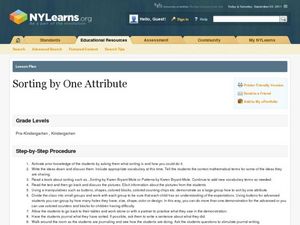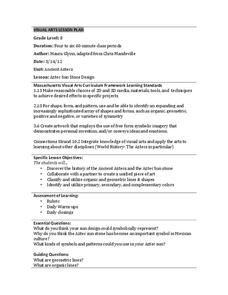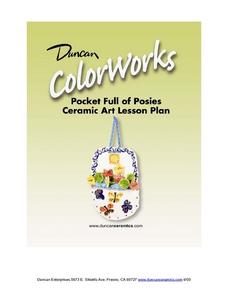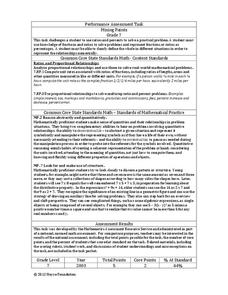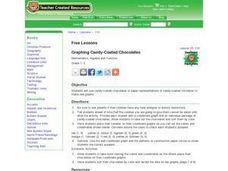Curated OER
Sorting By One Atrribute
Students use different color items to sort by color and different attributes of the manipulatives given to them. In this sorting lesson plan, students also write a journal entry or draw a picture of their activity.
Curated OER
Adventure Into The World of Shapes
Students view Elmer Holtzrichter's work Mystery Planet and discuss basic shapes and patterns. They create their own collage. and discuss the patterning they created. Students demonstrate how this pattern would sound with clapping and...
Curated OER
Dull Duck, Dashing Duck
Learners examine the different colors and patterns found on animals bodies, specifically birds. Through discussion, students discover the use of the colors and patterns for protection from predators and the advantages while hunting prey,...
Curated OER
"Colors" a poem by Shel Silverstein
Students collect data, graph it, and use the data to find measures of central tendencies, and find probabilities.
Curated OER
Ancient Aztecs
Is it a calendar? A religious symbol? A political statement? One thing for certain is that Aztec sun stone designs remain an important symbol in Mexican cultural art. Young artists craft their own Aztec Sun design incorporating ideas...
Resources for Educators
Math & Science Connection
Whether you're using a collection of Dr. Seuss books to teach basic math skills like counting, adding, and subtracting, or exploring the different states of matter by melting a crayon with a hairdryer, a series...
Curated OER
Pocket Full of Posies: Ceramics
After studying the plant or flower life cycle, have the class create a basket of flowers out of clay. They hone their ceramics skills while they push, pull, then paint clay to look like flowers they've seen in nature. There are several...
Center for Learning in Action
Properties of Balls
Enhance your states of matter lessons with a hands-on science investigation that compares six different balls' color, texture, size, weight, ability to bounce, and buoyancy.
Noyce Foundation
Mixing Paints
Let's paint the town equal parts yellow and violet, or simply brown. Pupils calculate the amount of blue and red paint needed to make six quarts of brown paint. Individuals then explain how they determined the percentage of the brown...
Curated OER
Tree Bark
Students explore and display textures of tree bark in a patterned arrangement of positive and negative space. They make crayon rubbings with various colors and arrange them in an original repetitive pattern. They glue finished designs to...
Curated OER
African Asimevo Cloth
Students research and observe the patterns and colors in Asimevo cloh of the Ewe people of Ghana in Africa. They compare the Asimevo cloth to other African textiles, such as Kete, Adinkra, and Kente cloth. They then create visual...
Curated OER
Creating Impact Craters
Sixth graders simulate the creation of impact craters on Mars.Through the creation of model surfaces, the effects of an impacting object's mass, velocity and size are determined, and the features of the resulting crater are identified.
American Chemical Society
Mysterious M&M's
The first in a six-lesson mini unit, all using M&Ms® candies, this physical science activity gets kids to observe a single piece and discover what happens when it is placed in a plate of water. The activity can be used to...
Curated OER
Create a Fan Design
Students design fans with organic shapes and contrasting colors. They recognize t'aeguk design as a visual element of Korean culture.
Curated OER
Visual Arts
Students recognize warm and cool colors in a different medium. They look carefully at slide of medieval stained glass.
Curated OER
Brown Bear, Brown Bear, What Do You See?
Students communicate and express ideas through drawings that represent the stated ideas. They use a pattern book after listening to the story, "Brown Bear, Brown Bear, What Do You See?"
Curated OER
Stoplight Problem Solving
In this problem solving instructional activity, students use the six different columns to create six different patterns for the red, yellow, and green lights for a stop light.
Curated OER
Curious George: Matching Activity
In this matching instructional activity, students help Curious George match his ties by drawing a line to connect each pair. Ties to match are various colors and patterns.
Curated OER
Visual Patterns in Tessellations Worksheet
In this tessellations instructional activity, students name 3 items that have tessellating patterns. Students then use the interactive tessellating program found at www.shodor.org to draw and answer 5 questions about their tessellations.
Curated OER
Map Coloring
In this math worksheet, students create a map using different colors. They use a specific pattern and can use only four colors. This worksheet is a proof of the making of a map using no more than 4 colors. There is an answer key.
Curated OER
Shaving Cream Art
Students participate in paper marbling. In this paper art activity, students use shaving cream and paint to create unique patterns on paper. Students mix shaving cream and paint together then lay paper down in the mix. The...
Curated OER
Graphing Candy-Coated Chocolates
Students place pieces of candy on their coordinate graphs as the teacher calls out the colors and coordinates embedded in the plan. The teacher circulates around the class to check each student's answers for accuracy.
Curated OER
Starlight, Star Heat
In this stars worksheet, students read how astronomers calculate the temperature of a star by measuring its color. Students use a chart showing star temperatures and colors to complete 3 short answer questions.
